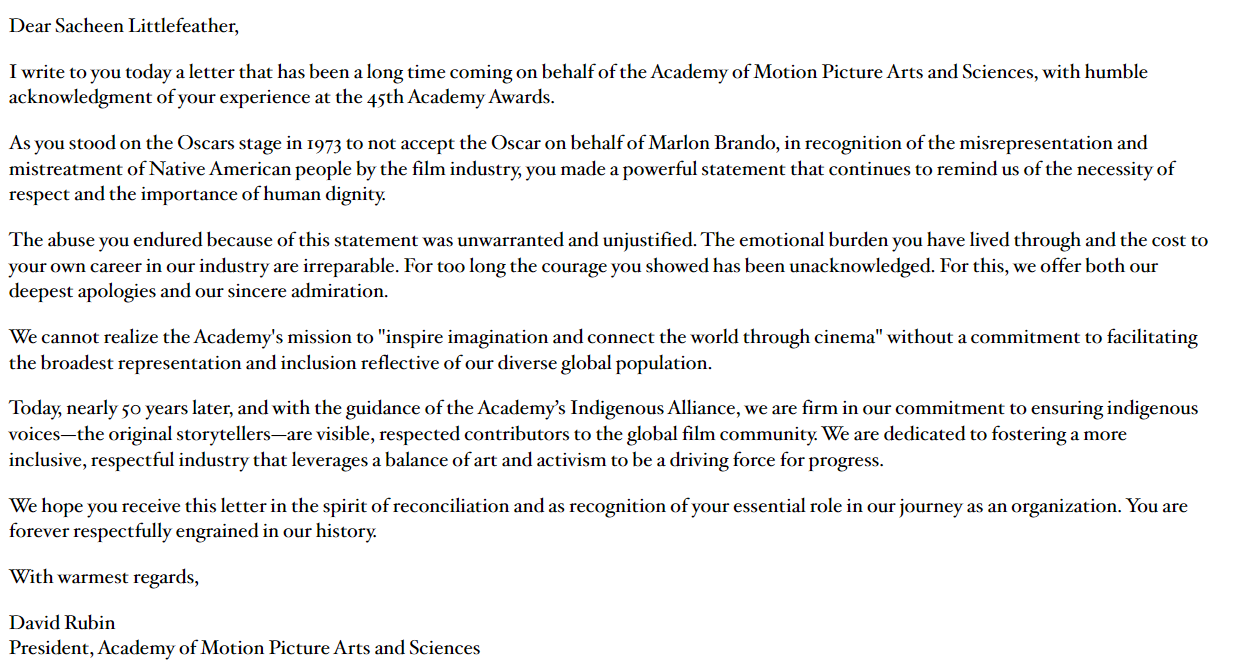Sacheen Littlefeather responds after Oscars apologise 50 years late over 1973 speech abuse
Former Academy president David Rubin acknowledged ‘the abuse you endured because of this statement’ in a letter of reconciliation to Littlefeather
Your support helps us to tell the story
From reproductive rights to climate change to Big Tech, The Independent is on the ground when the story is developing. Whether it's investigating the financials of Elon Musk's pro-Trump PAC or producing our latest documentary, 'The A Word', which shines a light on the American women fighting for reproductive rights, we know how important it is to parse out the facts from the messaging.
At such a critical moment in US history, we need reporters on the ground. Your donation allows us to keep sending journalists to speak to both sides of the story.
The Independent is trusted by Americans across the entire political spectrum. And unlike many other quality news outlets, we choose not to lock Americans out of our reporting and analysis with paywalls. We believe quality journalism should be available to everyone, paid for by those who can afford it.
Your support makes all the difference.Sacheen Littlefeather has responded after the Academy of Motion Pictures Arts and Sciences apologised for the abuse she endured over her 1973 Oscars speech.
Nearly 50 years ago, the actor and activist became the first Native American woman to take the stage at the Academy Awards stage, doing so at the request of Marlon Brando, to speak about the depiction of Native Americans in Hollywood films.
In the iconic, 60-second speech, Littlefeather explained that Brando was unable to accept the Best Actor Oscar for The Godfather due to “the treatment of American Indians today by the film industry.”
In a statement of reconciliation to Littlfeather, posted to the Academy website on Monday (15 August), president David Rubin acknowledged the “abuse you endured because of this statement” – terming Hollywood’s treatment of Littlefeather “unwarranted and unjustified”.
In the letter dated 18 June, he continued: “The emotional burden you have lived through and the cost to your own career in our industry are irreparable. For too long the courage you showed has been unacknowledged.
“For this, we offer both our deepest apologies and our sincere admiration.”
During her speech, some members of the audience booed Littlefeather, who was 26 at the time.
In 2020, she told the BBC she was escorted off stage by two security guards after her speech, adding “it was a good thing” because John Wayne “was furious with Marlon and furious with me” and wanted to pull Littlefeather off stage himself.

In his letter, Rubin called Littlefeather’s speech “a powerful statement that continues to remind us of the necessity of respect and the importance of human dignity.”
The Academy on Monday also said that it will host Littlefeather, now 75, for an evening of “conversation, healing and celebration” on 17 September.
Responding to the Oscars’ apology, Littlefeather said it was “profoundly heartening to see how much has changed since I did not accept the Academy Award 50 years ago”.

Watch Apple TV+ free for 7 days
New subscribers only. £8.99/mo. after free trial. Plan auto-renews until cancelled

Watch Apple TV+ free for 7 days
New subscribers only. £8.99/mo. after free trial. Plan auto-renews until cancelled
“Regarding the Academy’s apology to me, we Indians are very patient people – it’s only been 50 years!” Littlefeather said, adding, “We need to keep our sense of humour about this at all times. It’s our method of survival.”
In a podcast earlier this year with Jacqueline Stewart, a film scholar and director of the Academy Museum, Littlefeather reflected on what compelled her to speak out in 1973.
“I felt that there should be Native people, Black people, Asian people, Chicano people – I felt there should be an inclusion of everyone," said Littlefeather.
"A rainbow of people that should be involved in creating their own image.”
Additional reporting by Associated Press.
